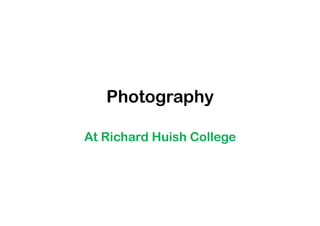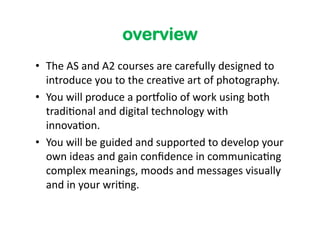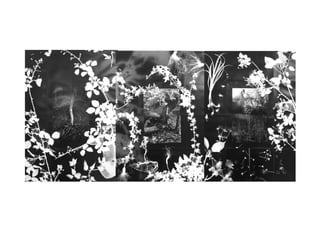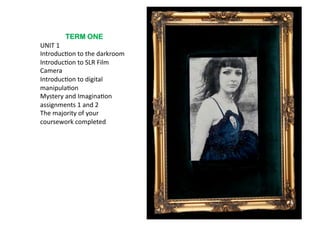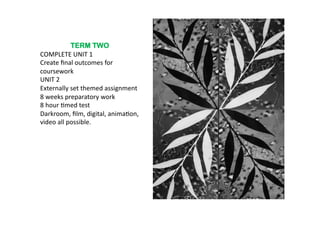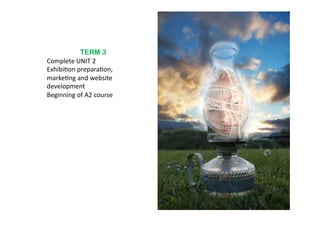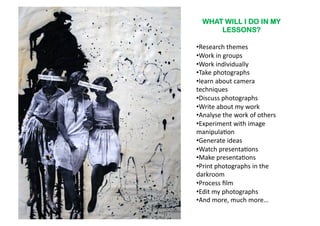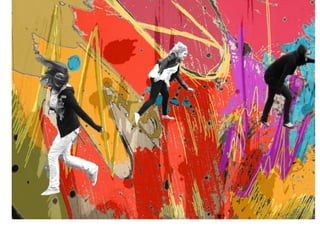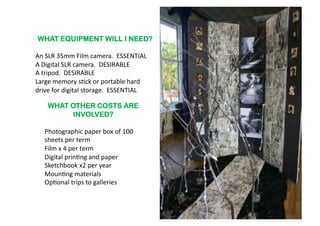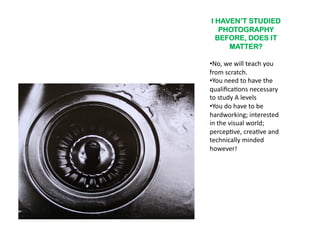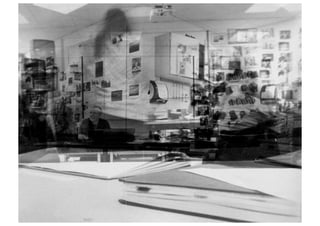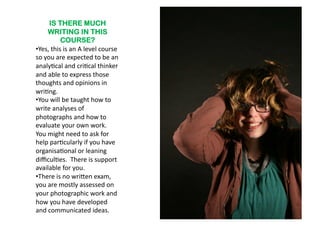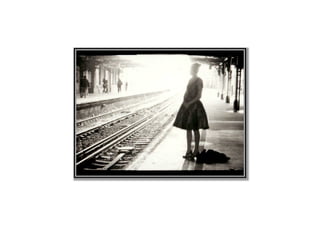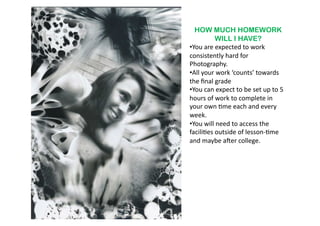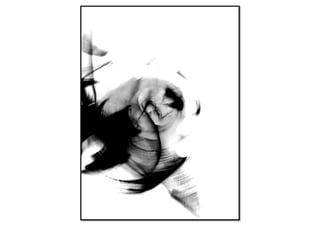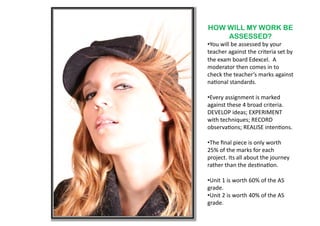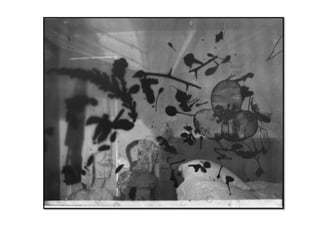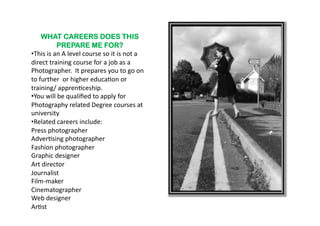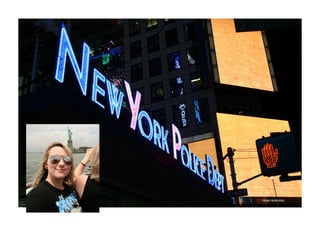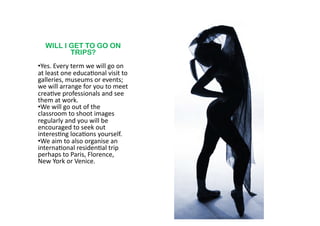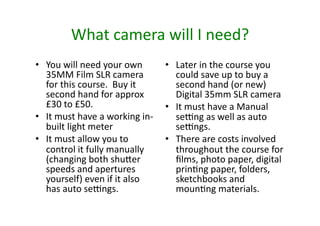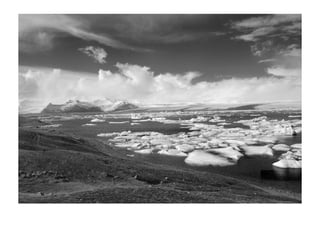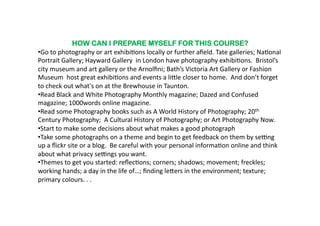Huish Photography course overview
- 1. Photography At Richard Huish College
- 2. overview ŌĆóŌĆł The ┬ĀAS ┬Āand ┬ĀA2 ┬Ācourses ┬Āare ┬Ācarefully ┬Ādesigned ┬Āto ┬Ā introduce ┬Āyou ┬Āto ┬Āthe ┬Ācrea6ve ┬Āart ┬Āof ┬Āphotography. ┬Ā ŌĆóŌĆł You ┬Āwill ┬Āproduce ┬Āa ┬Āpor<olio ┬Āof ┬Āwork ┬Āusing ┬Āboth ┬Ā tradi6onal ┬Āand ┬Ādigital ┬Ātechnology ┬Āwith ┬Ā innova6on. ┬Ā ┬Ā ŌĆóŌĆł You ┬Āwill ┬Ābe ┬Āguided ┬Āand ┬Āsupported ┬Āto ┬Ādevelop ┬Āyour ┬Ā own ┬Āideas ┬Āand ┬Āgain ┬Ācon’¼üdence ┬Āin ┬Ācommunica6ng ┬Ā complex ┬Āmeanings, ┬Āmoods ┬Āand ┬Āmessages ┬Āvisually ┬Ā and ┬Āin ┬Āyour ┬Āwri6ng. ┬Ā ┬Ā
- 4. TERM ONE UNIT ┬Ā1 ┬Ā Introduc6on ┬Āto ┬Āthe ┬Ādarkroom ┬Ā Introduc6on ┬Āto ┬ĀSLR ┬ĀFilm ┬Ā Camera ┬Ā ┬Ā ┬Ā Introduc6on ┬Āto ┬Ādigital ┬Ā manipula6on ┬Ā Mystery ┬Āand ┬ĀImagina6on ┬Ā assignments ┬Ā1 ┬Āand ┬Ā2 ┬Ā ┬Ā The ┬Āmajority ┬Āof ┬Āyour ┬Ā coursework ┬Ācompleted ┬Ā
- 5. TERM TWO COMPLETE ┬ĀUNIT ┬Ā1 ┬Ā Create ┬Ā’¼ünal ┬Āoutcomes ┬Āfor ┬Ā coursework ┬Ā UNIT ┬Ā2 ┬Ā Externally ┬Āset ┬Āthemed ┬Āassignment ┬Ā 8 ┬Āweeks ┬Āpreparatory ┬Āwork ┬Ā 8 ┬Āhour ┬Ā6med ┬Ātest ┬Ā Darkroom, ┬Ā’¼ülm, ┬Ādigital, ┬Āanima6on, ┬Ā video ┬Āall ┬Āpossible. ┬Ā ┬Ā
- 6. TERM 3 Complete ┬ĀUNIT ┬Ā2 ┬Ā Exhibi6on ┬Āprepara6on, ┬Ā marke6ng ┬Āand ┬Āwebsite ┬Ā development ┬Ā Beginning ┬Āof ┬ĀA2 ┬Ācourse ┬Ā
- 7. WHAT WILL I DO IN MY LESSONS? ŌĆóŌĆł esearch ┬Āthemes ┬Ā R ŌĆóŌĆł ork ┬Āin ┬Āgroups ┬Ā W ŌĆóŌĆł ork ┬Āindividually ┬Ā W ŌĆóŌĆł ake ┬Āphotographs ┬Ā T ŌĆóŌĆłearn ┬Āabout ┬Ācamera ┬Ā l techniques ┬Ā ŌĆóŌĆł iscuss ┬Āphotographs ┬Ā D ŌĆóŌĆł rite ┬Āabout ┬Āmy ┬Āwork ┬Ā W ŌĆóŌĆł nalyse ┬Āthe ┬Āwork ┬Āof ┬Āothers ┬Ā A ŌĆóŌĆł xperiment ┬Āwith ┬Āimage ┬Ā E manipula6on ┬Ā ŌĆóŌĆł enerate ┬Āideas ┬Ā G ŌĆóŌĆł atch ┬Āpresenta6ons ┬Ā W ŌĆóŌĆł ake ┬Āpresenta6ons ┬Ā M ŌĆóŌĆł rint ┬Āphotographs ┬Āin ┬Āthe ┬Ā P darkroom ┬Ā ŌĆóŌĆł rocess ┬Ā’¼ülm ┬Ā P ŌĆóŌĆł dit ┬Āmy ┬Āphotographs ┬Ā E ŌĆóŌĆł nd ┬Āmore, ┬Āmuch ┬ĀmoreŌĆ” ┬Ā A
- 9. WHAT EQUIPMENT WILL I NEED? An ┬ĀSLR ┬Ā35mm ┬ĀFilm ┬Ācamera. ┬Ā ┬ĀESSENTIAL ┬Ā A ┬ĀDigital ┬ĀSLR ┬Ācamera. ┬Ā ┬ĀDESIRABLE ┬Ā A ┬Ātripod. ┬Ā ┬ĀDESIRABLE ┬Ā Large ┬Āmemory ┬Ās6ck ┬Āor ┬Āportable ┬Āhard ┬Ā drive ┬Āfor ┬Ādigital ┬Āstorage. ┬Ā ┬ĀESSENTIAL ┬Ā ┬Ā WHAT OTHER COSTS ARE INVOLVED? Photographic ┬Āpaper ┬Ābox ┬Āof ┬Ā100 ┬Ā sheets ┬Āper ┬Āterm ┬Ā Film ┬Āx ┬Ā4 ┬Āper ┬Āterm ┬Ā Digital ┬Āprin6ng ┬Āand ┬Āpaper ┬Ā Sketchbook ┬Āx2 ┬Āper ┬Āyear ┬Ā Moun6ng ┬Āmaterials ┬Ā Op6onal ┬Ātrips ┬Āto ┬Āgalleries ┬Ā ┬Ā ┬Ā
- 10. I HAVENŌĆÖT STUDIED PHOTOGRAPHY BEFORE, DOES IT MATTER? ŌĆóŌĆł o, ┬Āwe ┬Āwill ┬Āteach ┬Āyou ┬Ā N from ┬Āscratch. ┬Ā ┬Ā ┬Ā ŌĆóŌĆł ou ┬Āneed ┬Āto ┬Āhave ┬Āthe ┬Ā Y quali’¼üca6ons ┬Ānecessary ┬Ā to ┬Āstudy ┬ĀA ┬Ālevels ┬Ā ŌĆóŌĆł ou ┬Ādo ┬Āhave ┬Āto ┬Ābe ┬Ā Y hardworking; ┬Āinterested ┬Ā in ┬Āthe ┬Āvisual ┬Āworld; ┬Ā percep6ve, ┬Ācrea6ve ┬Āand ┬Ā technically ┬Āminded ┬Ā however! ┬Ā ┬Ā
- 12. IS THERE MUCH WRITING IN THIS COURSE? ŌĆóŌĆł es, ┬Āthis ┬Āis ┬Āan ┬ĀA ┬Ālevel ┬Ācourse ┬Ā Y so ┬Āyou ┬Āare ┬Āexpected ┬Āto ┬Ābe ┬Āan ┬Ā analy6cal ┬Āand ┬Ācri6cal ┬Āthinker ┬Ā and ┬Āable ┬Āto ┬Āexpress ┬Āthose ┬Ā thoughts ┬Āand ┬Āopinions ┬Āin ┬Ā wri6ng. ┬Ā ŌĆóŌĆł ou ┬Āwill ┬Ābe ┬Ātaught ┬Āhow ┬Āto ┬Ā Y write ┬Āanalyses ┬Āof ┬Ā photographs ┬Āand ┬Āhow ┬Āto ┬Ā evaluate ┬Āyour ┬Āown ┬Āwork. ┬Ā ┬Ā You ┬Āmight ┬Āneed ┬Āto ┬Āask ┬Āfor ┬Ā help ┬Āpar6cularly ┬Āif ┬Āyou ┬Āhave ┬Ā organisa6onal ┬Āor ┬Āleaning ┬Ā di’¼ācul6es. ┬Ā ┬ĀThere ┬Āis ┬Āsupport ┬Ā available ┬Āfor ┬Āyou. ┬Ā ┬Ā ŌĆóŌĆł here ┬Āis ┬Āno ┬Āwri^en ┬Āexam, ┬Ā T you ┬Āare ┬Āmostly ┬Āassessed ┬Āon ┬Ā your ┬Āphotographic ┬Āwork ┬Āand ┬Ā how ┬Āyou ┬Āhave ┬Ādeveloped ┬Ā and ┬Ācommunicated ┬Āideas. ┬Ā
- 14. HOW MUCH HOMEWORK WILL I HAVE? ŌĆóŌĆł ou ┬Āare ┬Āexpected ┬Āto ┬Āwork ┬Ā Y consistently ┬Āhard ┬Āfor ┬Ā Photography. ┬Ā ┬Ā ŌĆóŌĆł ll ┬Āyour ┬Āwork ┬ĀŌĆścountsŌĆÖ ┬Ātowards ┬Ā A the ┬Ā’¼ünal ┬Āgrade ┬Ā ŌĆóŌĆł ou ┬Ācan ┬Āexpect ┬Āto ┬Ābe ┬Āset ┬Āup ┬Āto ┬Ā5 ┬Ā Y hours ┬Āof ┬Āwork ┬Āto ┬Ācomplete ┬Āin ┬Ā your ┬Āown ┬Ā6me ┬Āeach ┬Āand ┬Āevery ┬Ā week. ┬Ā ŌĆóŌĆł ou ┬Āwill ┬Āneed ┬Āto ┬Āaccess ┬Āthe ┬Ā Y facili6es ┬Āoutside ┬Āof ┬Ālesson-┬ŁŌĆÉ6me ┬Ā and ┬Āmaybe ┬Āaber ┬Ācollege. ┬Ā ┬Ā ┬Ā
- 16. HOW WILL MY WORK BE ASSESSED? ŌĆóŌĆł ou ┬Āwill ┬Ābe ┬Āassessed ┬Āby ┬Āyour ┬Ā Y teacher ┬Āagainst ┬Āthe ┬Ācriteria ┬Āset ┬Āby ┬Ā the ┬Āexam ┬Āboard ┬ĀEdexcel. ┬Ā ┬ĀA ┬Ā moderator ┬Āthen ┬Ācomes ┬Āin ┬Āto ┬Ā check ┬Āthe ┬ĀteacherŌĆÖs ┬Āmarks ┬Āagainst ┬Ā na6onal ┬Āstandards. ┬Ā ŌĆóŌĆł very ┬Āassignment ┬Āis ┬Āmarked ┬Ā E against ┬Āthese ┬Ā4 ┬Ābroad ┬Ācriteria. ┬Ā DEVELOP ┬Āideas; ┬ĀEXPERIMENT ┬Ā with ┬Ātechniques; ┬ĀRECORD ┬Ā observa6ons; ┬ĀREALISE ┬Āinten6ons. ┬Ā ŌĆóŌĆł he ┬Ā’¼ünal ┬Āpiece ┬Āis ┬Āonly ┬Āworth ┬Ā T 25% ┬Āof ┬Āthe ┬Āmarks ┬Āfor ┬Āeach ┬Ā project. ┬ĀIts ┬Āall ┬Āabout ┬Āthe ┬Ājourney ┬Ā rather ┬Āthan ┬Āthe ┬Ādes6na6on. ┬Ā ┬Ā ŌĆóŌĆł nit ┬Ā1 ┬Āis ┬Āworth ┬Ā60% ┬Āof ┬Āthe ┬ĀAS ┬Ā U grade. ┬Ā ŌĆóŌĆł nit ┬Ā2 ┬Āis ┬Āworth ┬Ā40% ┬Āof ┬Āthe ┬ĀAS ┬Ā U grade. ┬Ā ┬Ā
- 18. WHAT CAREERS DOES THIS PREPARE ME FOR? ŌĆóŌĆł his ┬Āis ┬Āan ┬ĀA ┬Ālevel ┬Ācourse ┬Āso ┬Āit ┬Āis ┬Ānot ┬Āa ┬Ā T direct ┬Ātraining ┬Ācourse ┬Āfor ┬Āa ┬Ājob ┬Āas ┬Āa ┬Ā Photographer. ┬Ā ┬ĀIt ┬Āprepares ┬Āyou ┬Āto ┬Āgo ┬Āon ┬Ā to ┬Āfurther ┬Ā ┬Āor ┬Āhigher ┬Āeduca6on ┬Āor ┬Ā training/ ┬Āappren6ceship. ┬Ā ŌĆóŌĆł ou ┬Āwill ┬Ābe ┬Āquali’¼üed ┬Āto ┬Āapply ┬Āfor ┬Ā Y Photography ┬Ārelated ┬ĀDegree ┬Ācourses ┬Āat ┬Ā university ┬Ā ŌĆóŌĆł elated ┬Ācareers ┬Āinclude: ┬Ā R Press ┬Āphotographer ┬Ā Adver6sing ┬Āphotographer ┬Ā Fashion ┬Āphotographer ┬Ā Graphic ┬Ādesigner ┬Ā Art ┬Ādirector ┬Ā Journalist ┬Ā Film-┬ŁŌĆÉmaker ┬Ā Cinematographer ┬Ā Web ┬Ādesigner ┬Ā Ar6st ┬Ā
- 20. WILL I GET TO GO ON TRIPS? ŌĆóŌĆł es. ┬ĀEvery ┬Āterm ┬Āwe ┬Āwill ┬Āgo ┬Āon ┬Ā Y at ┬Āleast ┬Āone ┬Āeduca6onal ┬Āvisit ┬Āto ┬Ā galleries, ┬Āmuseums ┬Āor ┬Āevents; ┬Ā we ┬Āwill ┬Āarrange ┬Āfor ┬Āyou ┬Āto ┬Āmeet ┬Ā crea6ve ┬Āprofessionals ┬Āand ┬Āsee ┬Ā them ┬Āat ┬Āwork. ┬Ā ┬Ā ┬Ā ŌĆóŌĆł e ┬Āwill ┬Āgo ┬Āout ┬Āof ┬Āthe ┬Ā W classroom ┬Āto ┬Āshoot ┬Āimages ┬Ā regularly ┬Āand ┬Āyou ┬Āwill ┬Ābe ┬Ā encouraged ┬Āto ┬Āseek ┬Āout ┬Ā interes6ng ┬Āloca6ons ┬Āyourself. ┬Ā ┬Ā ŌĆóŌĆł e ┬Āaim ┬Āto ┬Āalso ┬Āorganise ┬Āan ┬Ā W interna6onal ┬Āresiden6al ┬Ātrip ┬Ā perhaps ┬Āto ┬ĀParis, ┬ĀFlorence, ┬Ā ┬Ā New ┬ĀYork ┬Āor ┬ĀVenice. ┬Ā ┬Ā
- 21. What ┬Ācamera ┬Āwill ┬ĀI ┬Āneed? ┬Ā ŌĆóŌĆł You ┬Āwill ┬Āneed ┬Āyour ┬Āown ┬Ā ŌĆóŌĆł Later ┬Āin ┬Āthe ┬Ācourse ┬Āyou ┬Ā 35MM ┬ĀFilm ┬ĀSLR ┬Ācamera ┬Ā could ┬Āsave ┬Āup ┬Āto ┬Ābuy ┬Āa ┬Ā for ┬Āthis ┬Ācourse. ┬Ā ┬ĀBuy ┬Āit ┬Ā second ┬Āhand ┬Ā(or ┬Ānew) ┬Ā second ┬Āhand ┬Āfor ┬Āapprox ┬Ā Digital ┬Ā35mm ┬ĀSLR ┬Ācamera ┬Ā ┬Ż30 ┬Āto ┬Ā┬Ż50. ┬Ā ŌĆóŌĆł It ┬Āmust ┬Āhave ┬Āa ┬ĀManual ┬Ā ŌĆóŌĆł It ┬Āmust ┬Āhave ┬Āa ┬Āworking ┬Āin-┬ŁŌĆÉ senng ┬Āas ┬Āwell ┬Āas ┬Āauto ┬Ā built ┬Ālight ┬Āmeter ┬Ā senngs. ┬Ā ŌĆóŌĆł It ┬Āmust ┬Āallow ┬Āyou ┬Āto ┬Ā ŌĆóŌĆł There ┬Āare ┬Ācosts ┬Āinvolved ┬Ā control ┬Āit ┬Āfully ┬Āmanually ┬Ā throughout ┬Āthe ┬Ācourse ┬Āfor ┬Ā (changing ┬Āboth ┬Āshu^er ┬Ā ’¼ülms, ┬Āphoto ┬Āpaper, ┬Ādigital ┬Ā speeds ┬Āand ┬Āapertures ┬Ā prin6ng ┬Āpaper, ┬Āfolders, ┬Ā yourself) ┬Āeven ┬Āif ┬Āit ┬Āalso ┬Ā sketchbooks ┬Āand ┬Ā has ┬Āauto ┬Āsenngs. ┬Ā ┬Ā moun6ng ┬Āmaterials. ┬Ā ┬Ā ┬Ā
- 23. HOW CAN I PREPARE MYSELF FOR THIS COURSE? ŌĆóŌĆł o ┬Āto ┬Āphotography ┬Āor ┬Āart ┬Āexhibi6ons ┬Ālocally ┬Āor ┬Āfurther ┬Āa’¼üeld. ┬ĀTate ┬Āgalleries; ┬ĀNa6onal ┬Ā G Portrait ┬ĀGallery; ┬ĀHayward ┬ĀGallery ┬Ā ┬Āin ┬ĀLondon ┬Āhave ┬Āphotography ┬Āexhibi6ons. ┬Ā ┬ĀBristolŌĆÖs ┬Ā city ┬Āmuseum ┬Āand ┬Āart ┬Āgallery ┬Āor ┬Āthe ┬ĀArnol’¼üni; ┬ĀBathŌĆÖs ┬ĀVictoria ┬ĀArt ┬ĀGallery ┬Āor ┬ĀFashion ┬Ā Museum ┬Ā ┬Āhost ┬Āgreat ┬Āexhibi6ons ┬Āand ┬Āevents ┬Āa ┬Āli^le ┬Ācloser ┬Āto ┬Āhome. ┬Ā ┬ĀAnd ┬ĀdonŌĆÖt ┬Āforget ┬Ā to ┬Ācheck ┬Āout ┬Āwhat's ┬Āon ┬Āat ┬Āthe ┬ĀBrewhouse ┬Āin ┬ĀTaunton. ┬Ā ┬Ā ŌĆóŌĆł ead ┬ĀBlack ┬Āand ┬ĀWhite ┬ĀPhotography ┬ĀMonthly ┬Āmagazine; ┬ĀDazed ┬Āand ┬ĀConfused ┬Ā R magazine; ┬Ā1000words ┬Āonline ┬Āmagazine. ┬Ā ┬Ā ┬Ā ŌĆóŌĆł ead ┬Āsome ┬ĀPhotography ┬Ābooks ┬Āsuch ┬Āas ┬ĀA ┬ĀWorld ┬ĀHistory ┬Āof ┬ĀPhotography; ┬Ā20th ┬Ā R Century ┬ĀPhotography; ┬Ā ┬ĀA ┬ĀCultural ┬ĀHistory ┬Āof ┬ĀPhotography; ┬Āor ┬ĀArt ┬ĀPhotography ┬ĀNow. ┬Ā ┬Ā ŌĆóŌĆł tart ┬Āto ┬Āmake ┬Āsome ┬Ādecisions ┬Āabout ┬Āwhat ┬Āmakes ┬Āa ┬Āgood ┬Āphotograph ┬Ā S ŌĆóŌĆł ake ┬Āsome ┬Āphotographs ┬Āon ┬Āa ┬Ātheme ┬Āand ┬Ābegin ┬Āto ┬Āget ┬Āfeedback ┬Āon ┬Āthem ┬Āby ┬Āsenng ┬Ā T up ┬Āa ┬Ā’¼éickr ┬Āsite ┬Āor ┬Āa ┬Āblog. ┬Ā ┬ĀBe ┬Ācareful ┬Āwith ┬Āyour ┬Āpersonal ┬Āinforma6on ┬Āonline ┬Āand ┬Āthink ┬Ā about ┬Āwhat ┬Āprivacy ┬Āsenngs ┬Āyou ┬Āwant. ┬Ā ┬Ā ŌĆóŌĆł hemes ┬Āto ┬Āget ┬Āyou ┬Āstarted: ┬Āre’¼éec6ons; ┬Ācorners; ┬Āshadows; ┬Āmovement; ┬Āfreckles; ┬Ā T working ┬Āhands; ┬Āa ┬Āday ┬Āin ┬Āthe ┬Ālife ┬ĀofŌĆ”; ┬Ā’¼ünding ┬Āle^ers ┬Āin ┬Āthe ┬Āenvironment; ┬Ātexture; ┬Ā primary ┬Ācolours. ┬Ā. ┬Ā. ┬Ā ┬Ā ┬Ā
- 24. WANT ┬ĀTO ┬ĀKNOW ┬ĀMORE? ┬Ā Email ┬Āsa’¼Ćronl@richuish.ac.uk ┬Ā Huish ┬ĀPhotography ┬Ā Like ┬Āus ┬Āon ┬ĀFacebook ┬Āat ┬Ā

